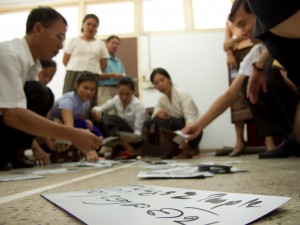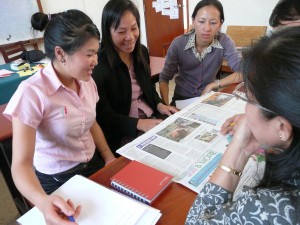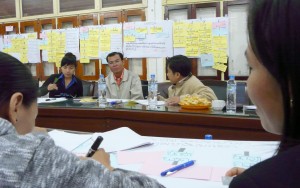Educators embark into a new era of journalism in Laos
 Is there a proper definition of journalism in the Lao language? Since DW-AKADEMIE’s first workshop on journalism at the National University of Laos in Vientiane, there is. It was conceived by 15 staff teachers of the Department of Mass Communication at the Faculty of Letters – after long discussions revolving around somewhat abstract terms like “media”, “the public”, “society” and “information”.
Is there a proper definition of journalism in the Lao language? Since DW-AKADEMIE’s first workshop on journalism at the National University of Laos in Vientiane, there is. It was conceived by 15 staff teachers of the Department of Mass Communication at the Faculty of Letters – after long discussions revolving around somewhat abstract terms like “media”, “the public”, “society” and “information”.
Lao is not a language that lends itself to describing abstract ideas. Yet the 15 teachers feel it was worth the effort to lay a foundation they now can build upon. They are learning the mindset, tools and skills that in combination make a journalist. The reasoning behind this is that they are the ones training a new generation of Lao students who are eager to take on the profession.
 Redefining public and professional understanding of journalism
Redefining public and professional understanding of journalism
Laos is opening up its state-controlled media market. The new economic era, started in the late 1980’s, only recently reached the media.
Today, more and more print publications and privately funded but state-controlled television and radio channels are starting up.
In this era of transition there is a dire need for new concepts. This involves exploring the very definition of journalism and the role of journalists.
Previously, a journalist served the government, “explaining the party’s policy to the people”. This is a concept that a growing number of people reject by simply switching off. The ruling People’s Revolutionary Party now officially wants to swap this premise for one that includes two-way communication between politicians and the people.
Uniting practice and theory
Still, the old mental models are deeply rooted – and so discussions about changing them are lively.
 The idea is for the university to become the focal point for dialogue about the concept of journalism in the making of a new Laos.
The idea is for the university to become the focal point for dialogue about the concept of journalism in the making of a new Laos.
Until then, practical training is interwoven with more theoretical exploration. “Types of questions and how to use them” was the main focus of a workshop in March.
The trainees are trainers themselves, so DW-AKADEMIE trainers put emphasis on creating a learning situation that conveys not only knowledge but also methods.
Here’s one training method that was both fun and effective. It’s called “Human Bingo” and is quite helpful for training the mechanics of open and closed questions:
Each participant tells the trainer something special about himself that the other participants don’t know or expect. It can be a talent, dream, wishes, plans. The trainer collects the statements individually (and hidden from the rest of the group), writes them down on individual cards that are then redistributed. Each participant gets one card and has to find out which statements belong to whom. Their first questions have to be general and open questions. If the interviewer thinks that the statement he’s holding in his hands fits the interviewee, he can ask directly about his assumption. But he should choose carefully when to guess because this is only allowed twice per person.
Try it yourself – it also works well as a warm up for all kind of group activities.
Contributed and photographed by Daniel Hirschler and Michael Karhausen



